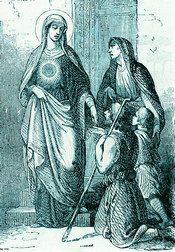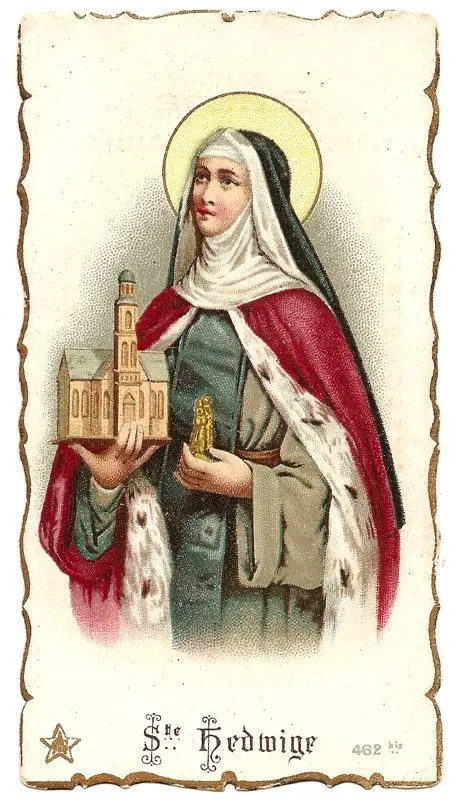Saint Hedwig of Silesia
Duchess, mother of the poor and peacemaker, Trzebnica and Wrocław, 12th–13th centuries. Born in Andechs in Bavaria, allied with the courts of France and Hungary, she combined asceticism and government under Henry the Bearded, head of the Piast house. Canonized in 1267 by Clement IV, she is celebrated on October 16 and honored as the patron saint of Silesia and Wrocław. Her death in Trzebnica on October 15, 1243, sealed a life devoted to monasteries, hospitals, and the poor.
Hedwig served the poor tirelessly in a fragmented Poland, which she helped to unite through diplomacy and practical charity. Duchess of Silesia, wife of Henry I the Bearded, she founded the Cistercian abbey of Trzebnica and retired there after 1238 to be with her daughter, Abbess Gertrude. In times of crisis, from Legnica to famine, she opened hospices and supported lepers, leaving a legacy of active mercy.

Biography
Being born in Andechs around 1174 meant entering a European network: his sister Agnes married Philip Augustus and his sister Gertrude married Andrew II of Hungary, mother of Saint Elizabeth.
Educated in Kitzingen, Hedwig married at the age of twelve Henry I the Bearded, future Duke of Silesia and soon Princeps of Poland, engaged in the reunification of the Piasts.
In 1202, she obtained the foundation of the Cistercian abbey of Trzebnica, the first female monastery in Silesia, a pivot of prayer and assistance.
With Henry, she multiplied donations and foundations, supporting Cistercians, Premonstratensians, Augustinians, Dominicans and Franciscans in the service of evangelization and the poor. Their household included seven children, including Henry II the Pious, the heir tragically killed at Legnica during the Mongol invasion in 1241. Widowed in 1238, Hedwig settled in Trzebnica near her daughter Gertrude, took the habit as a lay sister and continued her works without taking canonical vows in order to better administer her charitable assets.
Her charity was precise: a traveling hospital at court, a hospice, aid to lepers, reduction of peasant dues, and relief in times of famine. A woman of peace, she interceded in politics, obtained the release of the captive Henry, and calmed family conflicts, combining firmness and gentleness.
Her dynastic ties facilitated international contacts for the benefit of the kingdom, and her piety became a common language between peoples and religious orders. Hedwig died in Trzebnica on October 15, 1243, venerated for her simple asceticism and tireless work among the most vulnerable.
Her cult spread quickly and Clement IV canonized her on March 26, 1267, confirming the exemplary nature of her life.
Legend
Hedwig founded Trzebnica in 1202 and, widowed, remained there as a lay sister, continuing her sustained social work until her death in 1243.
It is said that she walked barefoot even in winter, carrying her shoes only in her hand on the orders of the bishop, a sign of stubborn humility.
Canonized in 1267, she became the patron saint of Silesia and a figure of political charity, inspiring sanctuaries, works, and iconography well into the 20th century. Her ability to combine monastic reform and government is noted, anchoring the spread of hospital institutions and popular devotional practices.
The memory of the dramas - the death of Henry II at Legnica - nourishes a spirituality of active consolation, attentive to the widows, orphans and wounded of history.
In art, the Vita beatae Hedwigis and numerous painted cycles show her as mediator and mother of the poor, unifying gentleness and decisiveness.

Message of the day
Choosing voluntary simplicity to free up resources for the poor: this is the axis of Hedwig, a duchess with a Franciscan heart.
The Gospel reads it in the light of Matthew 25: to serve Christ in the hungry, the stranger and the sick, without noise or calculation.
One image is enough: shoes held in the hand, so that the feet remain available for visiting and care, even in the social cold.
Prayer becomes action when it supports hospitals, hospices, and relief for farmers in crisis. Faith becomes political when it pacifies its own and obtains liberations without denying the truth.
Today, his path indicates sober and regular gestures, capable of reversing solitude with concrete mercy.
Prayer
Lord Jesus, through the intercession of Saint Hedwig, grant the grace of a simplicity that frees us from superfluity to serve the poorest.
Gives the strength, in family and social trials, to work for peace with patience and courage without renouncing justice.
Inspire humble and tenacious initiatives: visiting, caring, relieving, lightening burdens, building places of welcome and hope.
Make the heart faithful in daily service, so that love becomes a common path in the home, the parish and the city.
May the memory of Trzebnica and the poor cared for by Hedwig open paths of mercy today. Amen.

To live today
- Give a meal, warm clothing or a transport ticket to a person in need, with a kind word.
- Visit a sick, isolated or elderly person and offer a simple prayer at the bedside or over the phone.
- Read Matthew 25:31-40 for ten minutes and write down a concrete action to take this week.
Memory
Trzebnica (Trebnitz) remains the main sanctuary with the relics and tomb of Hedwig, a pilgrimage center since the 13th century.
Wrocław, of which she is patron, preserves a vivid liturgical memory and spreads her model of organized charity.
Berlin honors her name with St. Hedwig's Cathedral, a symbol of the Silesian diaspora in Prussian lands. In Bavaria, Andechs preserves relics and the family origins of a European saint through her alliances.
The liturgical feast is celebrated on October 16, while the Martyrology mentions its dies natalis on October 15, 1243 in Trzebnica.
Liturgy
- Readings/Psalm: Proper Option (United States): Sirach 26:1-4, 13-16; Psalm 128; Mark 3:31-35; or Communion of Saints/Nuns: Proverbs 31; Psalm 111(112); Matthew 25:31-40
- Song/hymn: Theme of active charity and family peace; possible incipit: “Blessed are those who fear the Lord” or “When the Son of Man comes.”



